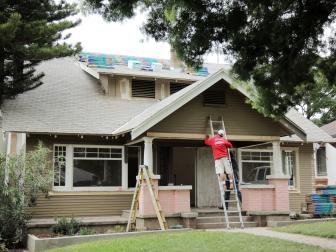Advantages and Disadvantages of Buying a Home in Foreclosure
Purchasing a foreclosed home can mean getting a bargain, but there are potential pitfalls too.

Sherwin Williams

You don't have to know a lot about real estate to know that a motivated seller can mean a lower price for the buyer. But buying a foreclosure can be unpredictable and risky, and it takes flexibility and patience. Learn the upsides and downsides of buying a foreclosure, where to find them and how to know whether you're getting a good deal.
Foreclosure in a Nutshell
Foreclosure is an often-lengthy legal process when a bank or lender repossesses a home in which the homeowner has defaulted on the payments. The bank takes ownership of the home and then sells it at auction. Foreclosure commonly comes about because a homeowner has failed to make mortgage payments, but it can happen for other reasons too, like unpaid property taxes. There are two types of foreclosure — judicial and nonjudicial — and both federal and state law, as well as the homeowner's own mortgage documents, dictate the process and timeline.
From a purchaser's perspective, foreclosure has three distinct stages: pre-foreclosure, auction and post-foreclosure. Homes can be purchased during any of those three stages. During the pre-foreclosure period, you are purchasing from a struggling homeowner trying to fend off foreclosure. In the other two stages, you are working with a bank that has wound up with a property on its ledgers instead of a mortgage. The home's location, the reason it's in foreclosure and where it is in the foreclosure process all affect a buyer, because these details confer certain rights on the homeowner, and create potential complications for the prospective sale.
The Good and the Bad
Each foreclosure stage holds distinct advantages and disadvantages for a purchaser, which we will summarize before digging a little deeper into some of the risks.
Pre-foreclosure
This stage includes a months-long missed-payments period before the lender has initiated foreclosure, and the period after the initial notice or lawsuit has been filed when the seller faces a countdown to the auction.
Advantages
- Bargaining power: If the seller isn't underwater on the mortgage, he or she may be motivated to achieve a fast sale and more likely to do repairs and provide price concessions during this period. If it is a short sale, the purchase price will be less than the seller owes on the mortgage. The seller and the lender may be actively trying to avoid a foreclosure and thus motivated to make a concession on the price. For more on this topic, see our article on short sale purchases.
- Condition and title knowledge: The seller must give a complete history of the property's condition. The buyer can do normal title searches and obtain desired inspections within the standard due diligence contingency period.
- Financing flexibility: The buyer can use regular mortgage financing and the seller may even be willing to work out alternative mortgage financing in the form of a lease-purchase agreement or mortgage assumption.
Disadvantages
- Price: Early in the game, the price may not be below market. If the seller is underwater and seeking a short sale, the seller's lender must agree and will negotiate for fair market value.
- Condition: If the homeowner is in financial trouble, there's a good chance the home has deferred maintenance. A short sale property is generally sold as-is.
- Lack of certainty and timeframe: Sellers may back out of a transaction if their financial situation improves. It can take a long time to negotiate with lenders, dragging out the process and sometimes nixing the sale altogether. The seller still has to move out and could be struggling with options for relocation.
Auction
At this point, the seller hasn't been able to rectify the situation, so the lender is permitted to auction off the property to recoup what it is owed. Since the lender can't profit from the foreclosure at auction, the bidding will start at the outstanding balance of the mortgage and fees, or sometimes less, to encourage bidding.
Advantages
- Price: You could get the property for substantially below market value.
- Time: You don't have to spend weeks or months in negotiations like in pre-foreclosure purchases.
- Lack of competition: Most auctions require cash bids, and this requirement could amount to slimmer competition at this stage more than any other.
Disadvantages
- Financing inflexibility and price: Only cash offers are accepted. You're on your own; no commissions will be paid to a buyer's representative. There may be auction fees.
- Condition and title knowledge: An as-is sale means the bank cannot provide disclosures as to property history or condition, and often inspections are not allowed. The buyer must also research the title before the auction and any liens or back taxes owed will be the responsibility of the buyer.
- Time: The previous homeowner may still have to move out and could be struggling with options for relocation.
Post-foreclosure
If the home doesn’t sell at auction, it becomes a bank-owned or real estate owned (REO) property, and the lender can sell it in the general real estate market or at a later REO auction.
Advantages
- Financing flexibility: The purchaser can use regular mortgage financing and the sale has a normal closing period.
- Price, bargaining power and concessions: The bank will pay the real estate agent's commission and may make further concessions (on the price, down payment, closing costs, escrow length) to get the property off its books. For some federal mortgage defaults, there may be special programs for owner-occupier purchasers to reduce price and competition substantially.
- Condition and title knowledge: The title will be clear, and the purchaser can get the usual inspections. The home is likely vacant.
Disadvantages
- Condition knowledge: The property is still an as-is sale, where the lender cannot provide disclosures as to property history or condition.
A little more on the downside
Despite the rock-bottom-prices hype, the market influences the price of foreclosures just like everything else; when there are a slew of them and not enough buyers, you can get a great deal on price. But when there aren't that many or everyone wants one, the price goes up and there may not be enough savings in the price to offset the financial risks.
And the risks are there. First and foremost is property condition: If the previous homeowners weren't able to make mortgage payments, there is a good chance they deferred home maintenance too. For properties that have been abandoned for a period of time, there may be leaks, problems with mold and vandalism, sometimes from the resentful prior owner. Those repair costs can be massive.
Another major issue could be additional liens, mortgages or back taxes on the property. Though these balances aren't your financial responsibility in pre-foreclosure purchases, they could complicate the purchase by increasing the amount owed by the seller and adding additional parties (read: time) to negotiations in short sales, in which each of the seller's lienholders must approve the sale. For an auction buy, secondary liens and mortgages constitute a very unwelcome surprise because the purchaser is responsible for it all, underscoring the importance of a comprehensive title search before auction and then title insurance as soon as possible after the auction.
Other problems that may affect your bottom line revolve around laws in your jurisdiction. You can have problems getting tenants, squatters and even the previous homeowner out of the property. In judicial foreclosure, the former owner is generally evicted as part of the court judgment but in nonjudicial foreclosure, the lender or purchaser of the home might have to get a separate Notice to Quit or file eviction proceedings. That means time, attorney's fees and possibly new property condition issues. Sometimes a buyer will propose a cash-for-keys deal, essentially paying the previous owner to leave and to do so nicely.
Another related issue is the right of redemption, explains mortgage lender Rocket Mortgage by Quicken Loans in its guide to buying a foreclosed home. You may go to the trouble of buying a home to have to turn around and sell the property right back to the former owner. This right exists up to the point of sale in all states, and even for a period after auction in some states. Additionally, in states with this right after auction, sometimes the previous homeowner can legally remain in the property during the right-of-redemption period.
Realizing that some of these pitfalls are largely issues with auctions and REOs, pre-foreclosure purchases start seeming pretty attractive: You are able to know the most about the property history and it has a higher likelihood of being in good condition. But foreclosure is a series of steps, not a one-day event, and during the pre-foreclosure period, the homeowner often has months to rectify his or her situation, meaning you spend time, effort and often cash working toward a sale that may not go through.
How to Know Whether a Foreclosure Is a Good Deal
A lot of the deal in a foreclosure comes down to you the buyer and the property's condition.
Do you have people who can fill in your gaps in knowledge or skill?
If you are purchasing the property at a time when you are able to examine it, don't skip thorough inspections. You may not be able to inspect a property up for auction, but that doesn't mean you can't do a little private detective work to give you an idea of what you may be getting into. Drive by the property to get a sense of the neighborhood and to check the home's condition from the road. Zillow also recommends checking for the assessed value for property taxes to see if it's substantially less than others in the area, a possible indication of hidden issues. Get a trusted contractor or handyman to give an estimate on repairs — both in terms of money and time.
In addition to your construction crew, you should enlist the help of an experienced real estate agent — one with expertise in foreclosures and distressed properties. This person can help you find properties before and after they hit the auction block as well as help you compare property prices in your area to see which ones actually constitute a good deal.
Are you buying the home as an investment property or to live in?
If you're considering the property as an investment to flip, start with the 70% rule. This commonly used guideline says to calculate 70% of the total price the home could sell for once it is fixed up, and then subtract the repair costs. That amount is the most you should pay. Obviously, making this calculation is difficult if you can't inspect the property because you may have only a glancing notion of what you're getting into for the repair bill. Err on the side of caution.
Owner-occupiers and first-time buyers may be able to avail themselves of incentives to purchase foreclosures through special mortgage rates and discounts. For example, HUD offers a rotating cast of properties in revitalization areas through their Good Neighbor Next Door program for a whopping 50% off if you fall into one of their special employment categories and commit to living in the property for three years.
5 Do's and 5 Don'ts for Flipping a House
Flipping a house comes with big risks, big rewards and big questions. Wondering where to buy and how much to DIY? Property expert Egypt Sherrod shares her top rules for first-time flippers.
How to Find Foreclosures
Where to look for properties varies by the stage of foreclosure.
- County Records: Once the foreclosure process has been initiated, it is a matter of public record, as is the notice of sale for an upcoming auction, so there should be a record filed with your county courthouse. Check your state laws covering the foreclosure notification process to find out exactly where to look. You can also check the county mortgage records for what is owed on the property.
- Local News Sources: Those initial foreclosure filings are often published in the local newspaper, as are auction notices. You may also find out that a homeowner is in financial trouble in the missed-payments period through word-of-mouth or social media.
- The MLS: The MLS will have pre-foreclosures and REOs. Homeowners that are in the missed-payments stage aren't technically in foreclosure yet, so you may never know the homeowner is in trouble by a real estate listing, but a real estate agent can often see what is owed on the property on the MLS.
- Online Real Estate Marketplaces: Pre-foreclosures and REOs can be found on real estate websites like Zillow. Pre-foreclosure properties will be designated by a bunch of different terms, according to Freddie Mac. Those listed as short sale, pre-approved by bank, subject to bank approval, third-party review required are properties where more is owed on the mortgage than the purchase price. The first two could be surer bets because the seller's bank is already on board with the sale. Also, some properties marked pre-foreclosure aren't even for sale; the price is simply an estimate based on area sales data and it was included on the website because there's a public notice on file. RealtyTrac offers a free search of foreclosures at all stages, with detailed info through a subscription service.
- Loan Servicing Companies: REOs can also be found on some of the major loan service company websites. Bank of America and Wells Fargo, among others, have searchable lists of the properties on their books.
- Federal Government: The federal government has several places to look for auctions and REOs. HUD ends up with properties from defaulted FHA loans as do Freddie Mac and Fanny Mae. Their First Look Program gives preferential treatment to owner-occupiers via the opportunity to purchase for a period of time before investors are able to make an offer. The IRS, the US Marshals and other federal agencies have auction sites for homes they ended up with through seizure and forfeiture instead of mortgage default. HUD has a useful clearinghouse page linking to all the places to find government properties.

.-Battle-on-the-Beach-courtesy-of-HGTV.-.jpg.rend.hgtvcom.196.196.suffix/1714761529029.jpeg)




































